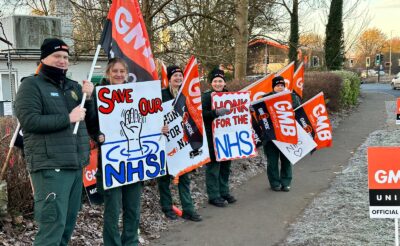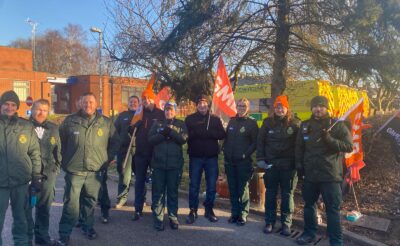East Midlands Ambulance Service GMB Members have voted to take strike action for better pay conditions.
This page will be updated as the campaign continues; follow along for up-to-date information on the industrial action.
Quick Links
- Go to… Picket Lines
- Go to… Latest Exemptions to Strike
- Go to… Latest News
- Go to… What to do on Strike Day
Claim Strike Pay – Claim Now
Last Update – 16 February 2023
Latest Picket Lines
Picket Line times 0800 – 1800.
Please also continue to follow StrikeLive for key updates on picket lines and more.
Leicestershire
- Goodwood Station – Picket Supervisor Noddy Mistry / GMB Officer Jim Clarke
- Gorse Hill – Picket Supervisor GMB Officer Ferdousara Uddin
- Oakham – Picket Supervisor Colin Maddams
- Narborough – Picket Supervisor Helen Stokes
- Loughborough – Picket Supervisor Tom Avis / Emma Newbrooks
- Hinckley – Picket Supervisor Sam Johnson
Derbyshire
- Chesterfield – Picket Supervisor Kerry Vaughan
- Heath – Picket Supervisor Adrian Else
- Willow Row – Picket Supervisor Jack Wastell-Mann
Nottinghamshire
- Kingsmill – Picket Supervisor Nigel Beasley
- Beechdale – Picket Supervisor Ranjit Khutan
- HART – Picket Supervisor TBC
- Worksop – Picket Supervisor Terry Sheppard
- Wilford – Picket Supervisor Peter Hibbett
- Stapleford – Picket Supervisor Matt Freer
- Hucknall – Picket Supervisor Darren Walker
- Newark – Picket Supervisor Nick Snaith
- Retford – Picket Supervisor Nicolle Reeves
Lincolnshire
- Lincoln – Picket Supervisor Colin Todd (GMB Officer)
- Boston – Picket Supervisor Ben Haigh
- Grimsby – Picket Supervisor Simon Lidgard
- Scunthorpe – Picket Supervisor Mark Jacobs
- Sleaford – Picket Supervisor Dannie Smith / Dave Shamma (GMB Officer)
- Louth – Picket Supervisor Steve Rack
Northamptonshire
- Mereway – Picket Supervisor Andrew Blankley
- Northampton North – Picket Supervisor Martin Murray / Dave Warwick (GMB Officer) / Natalie Grayson (GMB Officer)
- Kettering – Picket Supervisor Paul Bowman
- Corby – Picket Supervisor Paul Bowman
- Towcester – Picket Supervisor Louise Burgess
- Wellingborough – Picket Supervisor TBC
Exemptions to Full Strike
All member of GMB can exercise their right to take industrial action. This is a personal preference and you are legally protected to withdraw your labour.
Following the previous strike action taken in December 2022 and Janaury 2023, the exemptions have been reviewed and a few minor changes made; please see below.
Constructive conversations between trade unions and EMAS senior leaders have now concluded, and mutually acceptable derogations have been agreed.
Therefore, members of the GMB trade union due to work during the planned strike action period will need to decide which option they will be enacting.
A script will be used by the managers on station when passing a job to the picket line. Where there is no picket line or manager on station the job will be passed via the station phone or a handheld radio on a dedicated talk-group for communicating with Staff on Strike.
In the event that no EMAS manager is available on station, one member of striking staff (the Picket Supervisor ideally) will be in possession of the handheld radio to receive jobs from EOC for dissemination to Staff on Strike.
Previously, member have had the right to change their chosen derogations during the period of strike action. The Trust are now expecting members to choose which derogation they wish to work to at the start of their shift and remain working to that option for the full shift. If a member scales down their chosen derogation option during their shift (changing form C1 & C2 calls to just C1 for example) they will then remain working to that derogation option for the remainder of the shift. More details will be released in e-news.
For those working Overtime, Payback of TOIL during a day of Industrial Action, the discussed and agreed position between GMB and EMAS is that any GMB member choosing to work their day off, will lose their right to work derogations and will work to Option 2 – The Member chooses not to strike and will provide a normal working function.
If you are striking and do not plan to attend a picket line or station, please ensure you inform your local divisional management team before your shift is due to begin on the date of the industrial action.
Please note that if your part of your shift falls outside of the hours of Industrial action you will be expected to undertake you full duties.
Staff on training course also retain their right to strike and are requested to advise their training centre/facility prior to their course starting on the day of action if they choose to exercise this right.
Options Available to Members during Industrial Action
A&E Ambulance Staff
Option 1 – Member wishes to exercise their right to strike and will not respond to any category of call.
The member may choose to join a picket line or remain away from the workplace but must be contactable and in a fit state to respond to work in the event that a Major Incident is declared.
Option 2 – Member chooses not to strike and will provide a normal working function.
Option 3 – Member will only respond to Category 1 calls (fully coded prior to allocation).
Option 4 – Member will respond to Category 1 calls and Category 2 calls (fully coded prior to allocation) of the following types:
- Chest pain
- FAST-positive stroke (Cerebrovascular Accident/CVA) within 6 hours of symptom onset time
- Collapse outdoors or in a public place
- Road Traffic Collision where a patient is trapped
- Obstetric emergency where mother or baby are at risk
- Children aged five and under
- Children aged six to 16 years old, following a discussion with trade union Representative.
NB: 111 C2 calls are not included in the derogations, regardless of the nature of complaint
NB: C2 IFT calls are not included in the derogations, regardless of the nature of complaint (this includes transfer from any hospital facility where the call may not be coded as an IFT – for example community hospital transfer requests)
NB: Only calls coded by the AMPDS system and originating from a 999 call are included in the derogations. For example, an emergency call from Lincs CAS or similar community care provider are not covered by these exemptions
In addition, a conversation will take place between a clinician and the trade union representative in the Emergency Operations Centre (EOC) should there be a clinical concern to life or limb for a patient of any other Category 2 call, to see if a response can be made.
Urgent Care Assistants (UCAs)
Option 1 – Member wishes to exercise their right to strike and will not respond to any category of call.
The member may choose to join a picket line or remain away from the workplace but must be contactable and in a fit state to respond to work in the event that a Major Incident is declared.
Option 2 – Member chooses not to strike and will provide a normal working function.Option 3 – Member will only respond to back-up colleagues on a Fast Response Vehicle (FRV) who have requested a red back-up.
SORT Operatives and all Hazardous Area Response Team staff
Option 1 – Member wishes to exercise their right to strike and will not respond to any patients.
Option 2 – Member chooses to provide response to incidents requiring HART specific skill only
Option 3 – Member chooses to provide a response to incidents requiring HART-specific skills and requests for red backup from an ambulance on scene only.
Non-Emergency Patient Transport Services staff
Option 1 – Member wishes to exercise their right to strike and will not respond to any patients
Option 2 – Member chooses not to strike and will provide a normal working function
Option 3 – Member will work under the exemptions. This means they will only attend patients travelling for renal treatment or oncology treatment, or end of life care patients who are returning home or travelling to a hospice.
Emergency Operations Centre Staff – EMDs
Option 1 – Member wishes to exercise their right to strike and will not attend work.
Option 2 – Member chooses not to strike and will provide a full, normal working function.
Option 3 – Member will work to exemptions and only be available to answer 999 calls and undertake no other EOC duties.
Emergency Operations Centre Staff – Dispatch Officers
Option 1 – Member wishes to exercise their right to strike and will not attend work
Option 2 – Member chooses not to strike and will provide a full, normal working function.
Option 3 – Member working to exemptions and will provide a ‘Radio Operator’ only role:
- HP – Max of 1 of the 3 staff per dispatch desk will answer radio calls only and not dispatch crews or undertake any other EOC role
- BBH – Max of 1 of the 4 Dispatch Officers will answer radio calls only and not dispatch crews or undertake any other EOC role
- Staff wishing to undertake this option can ‘rotate’ through the roles by mutual agreement during the shift if the number of staff wishing to participate exceeds the maximum number agreed above.
Emergency Operations Centre staff – Clinical Assessment Team (CAT)
Option 1 – Member wishes to exercise their right to strike and will not attend work.
Option 2 – Member chooses not to strike and will provide a normal working function.
Option 3 – Member will work under the exemptions. This means they will only provide support to patients on the CAT stack and will not perform any other duties.
Enabling Services Staff (including Fleet and Logistics)
Option 1 – Member wishes to exercise their right to strike and will not attend work.
Option 2 – Member chooses not to strike and will provide a normal working function.
All managers
Option 1 – Member wishes to exercise their right to strike and will not attend work.
Option 2 – Member chooses not to strike and will provide a normal working function.
Please Note
- Industrial Action will take place between 0600hrs and 0800hrs the following day. Staff starting or finishing their shifts outside of these hours, will be expected to be at work as normal.
- Where possible, staff working to agreed exemptions will not work outside their dispatch area. However, by exception, a crew may be required to go further afield, however we will try to keep this to a minimum.
- Any staff member working to exemptions will only work from their base station and not be moved elsewhere to respond.
- All responses to those who have agreed to work under exemptions will be activated from the picket line via a verbal request (where there is no picket line, mobilisation will be via station telephone)
- No radios will be on the picket line by staff exercising their right to strike, however, once a job has been accepted the member must turn on their radio and log on to their Mobile Data Terminal until they are back at base for safety purposes. Outside of the operating hours of picket lines – which are stated to be 0800 until 1800 – jobs will be distributed via the station phone or handheld radio on the manager channel.
- When travelling back to base, if an open channel Category 1 broadcast is made with details of the incident, you can respond if you feel it is appropriate. However, you are under no obligation to do so.
Payments
Payment – A&E Ambulance Staff
- Members who choose Option 3 will be paid from when the call is accepted to when they return to base.
- Members who choose Option 2 or 4 will be paid for the full shift as normal provided they continue working to those exemptions for the full period of the shift.
Payment – UCAs
- Members who choose option 2 will be paid as normal for the full shift
- Members who choose option 3 will be paid from the time of allocation of the call until they return to base afterwards
Payment – Non-Emergency Patient Transport Services staff
- Members who choose Option 2 or 3 will be paid for the full shift as normal provided they continue working to those exemptions for the full period of the shift.
Payment – Emergency Operations Centre staff (all staff)
- Members who choose Option 2 or 3 (or 3 for CAT) will be paid for the full shift as normal provided they continue working to those exemptions for the full period of the shift.
Payment – All other staff
Members who choose Option 2 will be paid for the full shift as normal provided they continue working to those exemptions for the full period of the shift.
Latest Industrial Action News

Strike Pay Applications are Closing Soon
We will shortly be closing the applications so please ensure you submit your claim by 31st May 2023 in order to be paid your strike pay. We will be unable to process any claims after this date…

How did GMB EMAS members vote?
We want to be transparent and open with our members and have the final numbers for how members voted within EMAS.

GMB Pay Ballot – Results
56% of GMB members voted to accept the latest pay offer from the UK government.
What to do on Strike Day
What should I do on the Strike Day if I am off work?
Show your support for the strike by visiting the nearest picket line [see website].
Even if it is for an hour or two.
And feel free to invite friends or family to go with you and any furry friends.
What should I do on the Strike Day if I am at work?
Firstly, decide which derogation you are working to. There are 4 options and you will need to inform EMAS before the beginning of your shift.
The strike is from 6am on Monday morning until 8am on Tuesday morning. 20th Feb, 6th March & 20th March.
Will there be a picket line?
The picket lines run from 8am – 6pm. If you are on shift during these times, you should attend the picket line if there is one at your station.
The agreement with EMAS means we can use the facilities on station for food, drinks and toilets.
Should I bring anything with me to the picket line?
Try and make your picket line comfortable. Bring folding garden chairs, tables, gazebo, brazier, music, whistles, horns. Anything to make the experience enjoyable.
If you feel creative, bake a cake, cookies, make a chilli, curry, soup or what ever you think would be appreciated by your colleagues.
Do GMB provide flags and placards?
Yes, but feel free to make your own signs too. They sometimes have a greater impact with the public. If you have children, they may want to help?
What if there is no picket line at my station?
If you and your colleagues want to form your own picket line, please contact the GMB Branch and we will support you.
Alternatively, you can request to be relocated to a station with a picket line to respond under derogation from there.
Or stay in the crew room if you are responding under derogation 3 or 4.
My shift starts after the picket line has finished, what should I do?
If you are on full strike once you have informed EMAS of your intention, you do not need to attend the station, but be available should there be a major incident.
If you are responding to CAT 1’s or CAT 1’s & some CAT 2’s under the derogations, you should stay in the crew room and respond when the need arises.
What’s the point of a picket line?
Picket Lines are made up of members who would otherwise be at work but are instead, on strike that day. They’re held outside workplaces where strike action is taking place. There will be Picket Lines at various EMAS sites across the Region. See our List of Picket Line locations for the upcoming days of Industrial Action.
How can I show my support for people picketing?
Supporters who are not due to be at work can visit the Picket Lines to show solidarity with the staff taking part in the strike. We’d welcome as much support as possible to demonstrate to the Government, our employer, the public and the media how passionately people feel about fair pay, working conditions and patient safety – In fact, we are actively encouraging both GMB members and non GMB members to attend Picket Lines on their rest days to show their support and increase the visibility of our action.
How many people can join a picket line?
There is no legal limit on the number of people on a Picket Line. The codes of practice for picketing recommend six people on a Picket Line, however, as long as the picket is peaceful, you and fellow striking colleagues can gather to picket with more than six people.
How long will I need to stand on the picket line?
Picket Lines are usually in place between 8am and 6pm on days of strike action. Members can be part of a picket for as short or as long a period of time as they want to be, with regular breaks encouraged. This may involve a locally developed rota to ensure the Picket Line is covered while maintaining members’ comfort and wellbeing.
